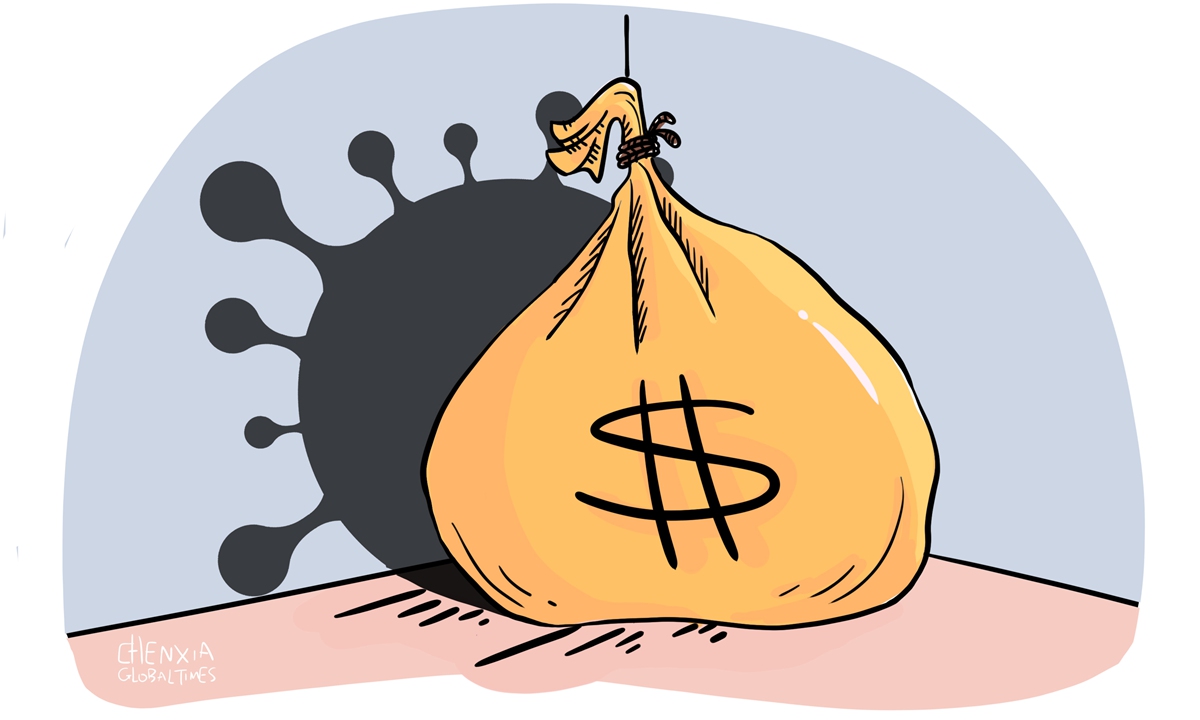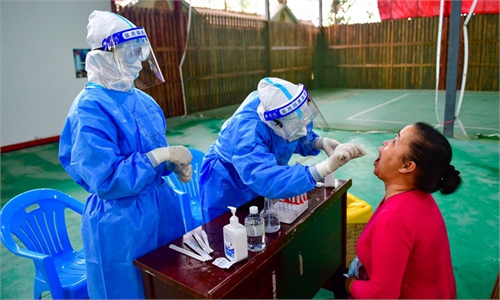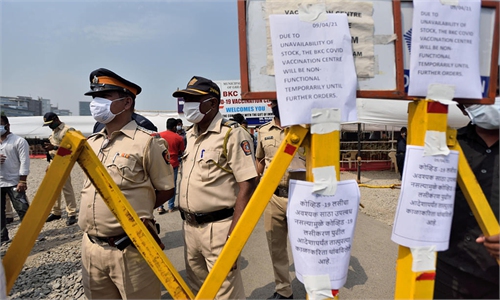COMMENTS / COLUMNISTS
Surging coronavirus variants continue to shadow economies

Illustration: Chen Xia/GT
New and more contagious coronavirus variants from the UK, Brazil and South Africa are continuing to penetrate the world's major economies, including the US, Europe, Canada, Brazil, India and Argentina, forcing many local governments to impose harsher night curfews or lockdowns. The new variants are also driving many young people to become gravely ill and hospitalized.Worldwide Covid-19 deaths are growing once again, particularly in India and Brazil. On Saturday, India reported another record high of more than 145,000 new infections and daily new deaths of 794, hitting their highest level in the past five months. India's total number of infections is now inching closer to Brazil's 13.28 million, though still far from the US' more than 30 million cases.
The new wave of infections and fatalities is certain to cast a shadow on the rosy expectations of economies in 2021 forecasted by global organizations like IMF. To make things worse, the efficacy of the vaccines developed by large pharmaceutical companies to stifle the new variants is dubious, and some vaccines are reported to have produced serious blood clots and other side-effects.
A blunder has been made by many countries in re-opening their economies too prematurely last year when the virus caseloads had not dropped to zero. Some tend to blame public fatigue with strict lockdowns as the culprit. But it's those governments to blame.
It never works if a government, desperately wanting to improve its economy and save jobs, enforces restrictions or lockdowns intermittently or casual-mindedly.
To the chagrin of the epidemiologists and economists alike, those governments, until today, are embroiled in a severe misunderstanding of the relationship between the virus and the economy. Prior to completely containing the contagion, people's health will always be under the variants' curse.
Last year an American state leader (from Texas state) said "there are more important things than living", which drew massive ridicule for being so dismissive of human life. In those politicians' small eyes and tiny brains, the losses of jobs and income and other associated damages to living standards were even greater than the costs of a virus that kills a small percentage of the people who get it.
Only after completely stamping out the virus and its mutant variants will the world's economy be seated on rocks. China's seriousness in enforcing lockdowns in the whole Hubei Province last spring, and now the whole southwestern Ruili city neighboring Myanmar, and the government's high alert to prevent virus-tainted meat and seafood imports from causing another wave of infections, is a good case study for other economies.
Lately, Ruili mayor and other senior city officials were sacked, to demonstrate accountability for their lapse in stopping virus-carrying Myanmar residents from slipping into the border city, which triggered the city's lockdown by Beijing. As a precaution, all tourists visiting the city are being placed under a two-week quarantine before leaving for home.
The Chinese government's strong-handed measures to stifle the virus from spreading have succeeded, instilling confidence in the Chinese people to restart their factories and businesses, to roam freely on the streets, to shop at their will and take the flights and high-speed trains, to reopen the schools and to have family and friends' gathering. The draconian lockdown in the first quarter last year led to a 6.8 percent plunge in China's quarterly GDP, which is expected to roar back with a 15-18 percent growth in the first quarter of this year.
However, many other governments are coping with new increases in virus infections after prematurely deciding to reopen their cities and society. The world had seen the former Trump administration ordering to stop a-month-long lockdown on May 1, 2020, which led to the subsequent catastrophe of a ferocious surge in caseloads throughout 2020 and more than 560,000 deaths in the US.
The Indian government has also made an unforgettable mistake. When daily infections fell below 10,000 in February 2021, officials in New Delhi were congratulating each other and celebrating, as if the virus would disappear in India. They dropped their guard, allowing and encouraging dangerous behaviors disregarding the rules of prevention, and many of the country's 1.35 billion people ignored face masks and social distancing rules, and now, the virus has come back with a vengeance.
Days after New Delhi declared Indian's Covid-19 outbreak was contained in late January, the country's biggest city, Mumbai, reopened its huge suburban train network and authorities let tens of thousands of visitors into stadiums for cricket matches.
According to local media reports, election rallies led by Prime Minister Narendra Modi, main opposition party leader Rahul Gandhi and other political leaders, as well as crowded traditional festivals and Indian religious gatherings, have collectively contributed to the recent record resurgence of the virus in March and April. Now, Oxford Economics warned that the brutal coronavirus resurgence in India would raise concerns that Indian economy's nascent recovery will be derailed.
Like Washington, politicians in New Delhi have fiercely advocated against another national lockdown for fear of maiming Indian economy.
However, when the resurgence of tens of thousands is formed in a poor and populated country like India, the upward trend is going to develop for a couple of weeks, if not months. And, the fleeing exodus of rural migrant workers could spread the virus to Indian's small towns and villages. Now, the situation is very fluid for Modi's government to handle.
The author is an editor with the Global Times. bizopinion@globaltimes.com.cn



